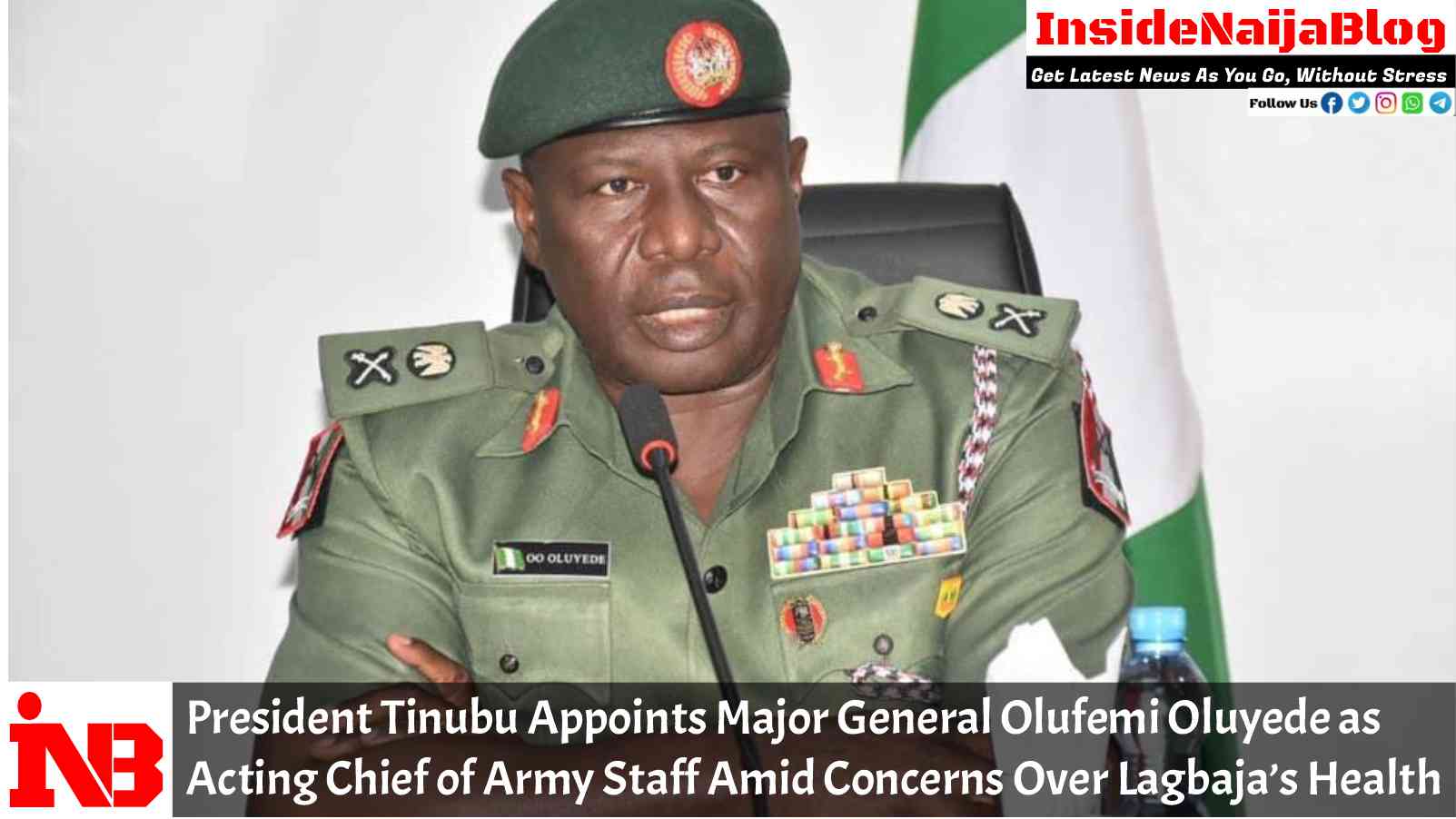President Bola Tinubu has appointed Major General Olufemi Olatubosun Oluyede as the acting Chief of Army Staff (COAS), following the critical health status of the current COAS, Lieutenant General Taoreed Lagbaja. This temporary transition, announced by Tinubu’s Special Adviser on Information and Strategy, Mr. Bayo Onanuga, underscores the need for continuous military leadership as Lagbaja undergoes treatment overseas. The president’s swift appointment of Oluyede is meant to maintain operational readiness and stability within the Nigerian Army as Lagbaja recovers.
Background on Major General Oluyede
At 56, Oluyede is a well-respected senior officer with extensive field and administrative experience in the Nigerian Army. Before stepping into the acting COAS position, Oluyede served as the 56th Commander of the Infantry Corps, one of the Nigerian Army’s elite units based in Jaji, Kaduna. Both Oluyede and Lagbaja share a professional history, having been coursemates in the 39th Regular Course, a prestigious training program that has produced many of Nigeria’s top military leaders. He was commissioned as a second lieutenant in 1992, though his military service dates back to 1987, and he attained the rank of Major-General in September 2020.
Military Experience and Recognitions
Over the years, Oluyede has garnered substantial expertise, which will be instrumental in his role as acting COAS. His early roles included serving as Platoon Commander and adjutant at the 65 Battalion and as Company Commander at the 177 Guards Battalion. Oluyede also took on significant responsibilities as Staff Officer in the Guards Brigade, overseeing personnel management and strategic planning. His experience extends to commanding the 27 Task Force Brigade, where he played a pivotal role in Operation HADIN KAI, a military initiative designed to combat insurgency in the northeastern region of Nigeria.
Oluyede’s career has also seen him in international operations, which have shaped his reputation as an adept military strategist. He was involved in the Economic Community of West African States Monitoring Group (ECOMOG) mission in Liberia, an intervention aimed at restoring stability during the Liberian civil war. He also served in Operation HARMONY IV, a peacekeeping mission in the contested Bakassi region. These operations enhanced his experience with multi-national forces and demonstrated his capability to lead complex, multi-faceted missions.
In recognition of his exemplary service, Oluyede has earned numerous awards and honors, such as the Corps Medal of Honour, the Grand Service Star, and the Chief of Army Staff Commendation Award. Additional accolades, like the Field Command Medal, the Field Command Medal of Honour, and the Field Training Medal, reflect his operational and leadership strengths. These awards have established him as one of the Nigerian Army’s most decorated officers, reinforcing confidence in his ability to serve as acting COAS.
Lagbaja’s Health Situation and Army Response
Lagbaja’s health issues and temporary absence have garnered significant public and media attention. On October 20, 2024, rumors of Lagbaja’s alleged passing began circulating on social media after a Nigerian journalist posted claims that the COAS had died of cancer. This post went viral, spurring numerous speculations regarding succession in the army’s top leadership. However, the Nigerian Army was quick to dispel these rumors. On October 21, Brigadier General Tukur Gusau, Acting Director of Defence Information, released an official statement confirming that Lagbaja remains alive, though critically ill, and receiving treatment outside Nigeria. The Defence Headquarters further clarified that while Lagbaja is indeed indisposed, his position is still formally intact, and Oluyede’s appointment as acting COAS is only a temporary measure.
Despite the official clarification, speculation continues as sources within the Nigerian Army indicate Lagbaja’s health is indeed severe. “COAS is not dead. He is only critically ill at the moment. We should be praying for him at this critical time and not spreading rumors that he died,” stated a source. Another individual close to the situation mentioned that the COAS was receiving intensive medical attention abroad, underscoring the importance of respecting his privacy and focusing on his recovery.
Significance of Oluyede’s Appointment
The interim appointment of Oluyede as acting COAS highlights the Nigerian government’s commitment to ensuring continuity within its military leadership. This move reflects the importance of maintaining command and control structures, especially given the critical security challenges Nigeria faces in regions such as the Northeast, where insurgency persists, and other areas battling banditry and communal conflicts. The Nigerian Army, as a central force in national security and counter-terrorism efforts, relies on stable and decisive leadership. Oluyede’s leadership is expected to provide a steady hand in ongoing military operations, prevent any potential disruption due to Lagbaja’s absence, and assure both military personnel and the public of the government’s commitment to stability and security.
Legacy and Contributions of Lt. Gen. Taoreed Lagbaja
Lagbaja’s tenure as COAS, beginning with his appointment by President Tinubu in June 2023, has been marked by notable reforms and strategic initiatives aimed at improving the Nigerian Army’s operational readiness and welfare. Known for his dedication to internal security and modernization of military facilities, Lagbaja has championed several welfare programs for soldiers and emphasized the need for discipline and professionalism within the ranks. His leadership style has been a mix of rigor and empathy, making him a respected figure within the armed forces. Lagbaja’s absence, though temporary, has generated concern within the military community, which has recognized his significant contributions to the Nigerian Army.
Strategic Focus on Infrastructure and Security
President Tinubu’s swift appointment of Oluyede also reinforces his administration’s strategic focus on stability and efficiency within the armed forces. The administration has identified military and security reforms as critical components of national development. In recent months, Tinubu has emphasized collaboration with military leaders to address pressing security issues and has encouraged policies designed to attract and retain talent within the military. As acting COAS, Oluyede is expected to carry forward these priorities, particularly in addressing internal security issues and fostering collaborative efforts with other security agencies.
Future Implications
The transition from Lagbaja to Oluyede, albeit temporary, could have lasting implications on the Nigerian Army’s strategic direction. Observers speculate that Oluyede’s extensive field experience might introduce nuanced approaches to counter-insurgency operations and potentially strengthen collaboration with regional and international security partners. With Lagbaja’s health condition remaining uncertain, the Nigerian military community is bracing for either a full recovery or a more permanent leadership change, depending on the course of events in the coming weeks. Regardless of the outcome, Oluyede’s appointment is widely seen as a positive move to maintain the Nigerian Army’s stability and operational effectiveness.
As Nigeria continues to navigate security challenges, the Nigerian Army’s leadership under Oluyede is anticipated to prioritize continuity, operational excellence, and adherence to the professional standards that have defined the army’s recent trajectory.




